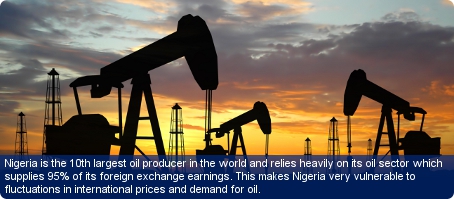Find a business in Nigeria
- Part I
- Part II

The Nigerian economy is based on strong agriculture, oil and gas sectors. However, because of its dependence on oil revenues the economy is very vulnerable to fluctuations in international prices. Demand for oil accounts for more than 95% of export earnings and up to 80% of federal revenue. Nigeria has a GNI per capita of US$1,440 (2012) and has seen strong GDP growth of 6.9% per annum (2008-12). This growth has been sustained in a climate of stronger international oil prices but diversification is needed if the economy is to continue growing in the future and be more resilient to external economic shocks. Nigeria is the most populous country in Africa, with a population of over 150 million and this provides a large market for its agricultural produce.
The agriculture, forestry and fisheries sectors together contribute 35% of Nigeria’s GDP (2010). The agricultural sector is largely small scale and very diverse, but dominates the rural economy. Agricultural produce includes cocoa, palm oil, rubber, peanuts, corn, rice, sorghum, millet, cassava (tapioca) and yams and a range of livestock – cattle, sheep, goats and pigs.
Aside from agriculture, oil dominates the Nigerian economy and is the major foreign currency earner. The country has 37.2 billion barrels of proven oil reserves and 5.292 trillion cubic metres of proven natural gas reserves (January 2011 estimate). The establishment of the West African Gas Pipeline is set to provide a secure basis for future gas exports.

Once self-sufficient in food, by 1997 the country had become a major food importer. Development aid and foreign loans and investment had decreased dramatically. From May 1999, with the support of the IMF, the World Bank and the international community, the civilian government committed itself to reforming policies, including privatisation of state enterprises and modernisation of agriculture, with the public sector concentrating on infrastructure and education and the private sector leading economic growth.
Since 2008 the government has begun to show the political will to implement the market-oriented reforms urged by the IMF, such as modernising the banking system, removing subsidies, and resolving regional disputes over the distribution of earnings from the oil industry. GDP rose strongly in 2007-11 because of growth in non-oil sectors and robust global crude oil prices. But a lack of infrastructure and slow implementation of reforms are key impediments to growth.
There are almost 200,000 km of roads, a third of them paved. But some secondary roads are impassable during the rains. Nigeria has four main international airports.
The West African country is ranked 133rd out of 183 for the ease of doing business, according to the World Bank’s ‘Doing Business 2012’ study. But it is ranked ninth best in the sub-Saharan African region for protecting investors. These rankings measure the conduciveness of a regulatory regime in starting and operating a business.
Nigeria has a 51.1% adult literacy rate (2008) and English is generally used in professional and business life.












